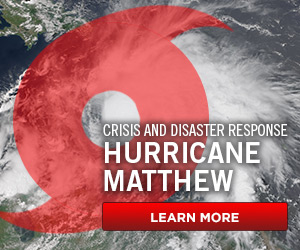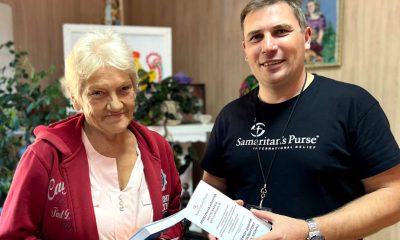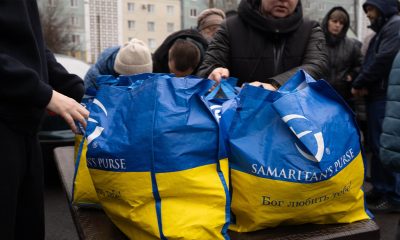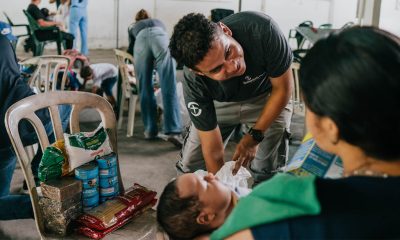Medical teams are expanding our response in cholera-stricken areas of Haiti's southwestern peninsula.
Ever since entering the fight to combat cholera in the hurricane-ravaged southwestern peninsula of Haiti, Samaritan’s Purse has again and again witnessed God’s clear and glorious leading, provision, and healing.
The story of our Cholera Treatment Center in Chardonnieres is a God story—one in which His love is being demonstrated and declared in this town of 24,100 people that brushes up against the Caribbean Sea.
Whether you talk with patients, political leaders, or team personnel, a theme is interwoven throughout this vital response: this is a heaven-sent mission of mercy in Jesus’ Name.
The Dangers Are Real
Hurricane Matthew unleashed its 145-mile-per-hour winds, punishing rains, and dangerous storm surge on Haiti two weeks ago. It ripped through homes, snapped coconut palm trees, upended steel concrete poles, and drenched everything in sight. According to Mayor Claude Memeus, the storm and ensuing cholera outbreak have claimed at least 285 lives in Chardonnieres.
“Our town was completely destroyed,” he said. “Only one to two percent of houses are left.”
Samaritan’s Purse responded immediately to the hurricane: sending tarps, hygiene kits, water filtration units, and blankets to Jeremie and Les Cayes, two other cities pulverized by Hurricane Matthew.
Then cholera surfaced, setting off alarm bells within Samaritan’s Purse, which helped lead the fight against the disease after a powerful earthquake devastated Haiti in 2010.
Ground zero is Chardonnieres. Again, we acted quickly, dispatching qualified medical personnel and supplies to establish a significant presence through our Cholera Treatment Center in compliance with the Haitian Ministry of Health. This was similar to what we did after the earthquake in Port-au-Prince, Haiti’s sprawling capital city.
Cholera remains an ongoing threat to the coastal town—and surrounding region.
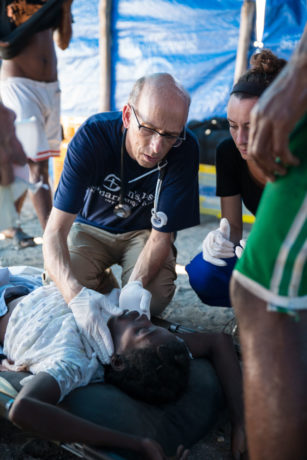
Dr. Joe Lamb and nurse Summer Blackwell are using their medical training to serve the people of Haiti in Jesus’ Name.
“It’s critical that we take measures to contain it,” said Dr. Lance Plyer, medical adviser for our Disaster Assistance Response Team (DART). “After the hurricane passed, we’ve had significant rainfall and, as the water table rises, the contaminants spread. If people get cholera and go to a place like Port-au-Prince and if it gets in a key water supply like it did in 2010, it could kill thousands.”
To date, our volunteer doctors and nurses have treated more than 350 people in Chardonnieres, an average of 40 to 50 patients per day—from infants to the elderly. Many come in on stretchers, uncommunicative, gaunt with their eyes sunken—the face of cholera. Not everyone has been stricken by this horrific waterborne disease that can kill within hours. Others have arrived with similar severe diarrhea symptoms but not diagnosed as cholera.
“But the number of cholera cases is rising,” Dr. Lance warned.
At the same time, we have been treating people who suffered injuries from the hurricane, including deep, infected wounds.
All in all, our teams are working long hours, but remain faithful to their mission of demonstrating the compassion of Jesus Christ. “If we don’t do it with compassion, gentleness and kindness, we’re not really serving well,” said Dr. Joe Lamb, a family practice doctor from Wisconsin serving on our DART. “It’s not the medical care by itself, it’s also serving how Christ calls us to serve”
Our Outreach Extended
Our cholera response has broadened to impact other areas as well.
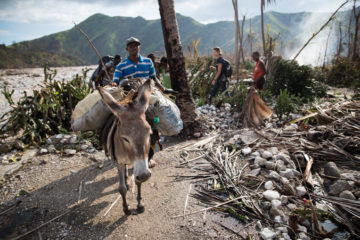
Our team is on the way up the mountain by mule to help people in a remote area affected by cholera.
We sent a physician and nurse practitioner to a remote region in the mountains surrounding Chardonnieres. They were joined this past weekend by two nurses and a water, sanitation, and hygiene (WASH) expert. Since the road was washed out, we had to load supplies on eight donkeys, led by 15 Haitian porters. They hiked four hours on an arduous journey that included traversing rocks and wading through river waters. A second mule team has taken more supplies in hopes of continuing the treatment of cholera victims there.
Since many people bathe and drink out of the same water source, another prong of our vital response includes partnering with local churches so we can educate communities about basic hygiene practices. This is key to preventing the further transmission of cholera and other waterborne diseases. We will also be helping to improve the purification capacity of their water system to prevent the further spread of disease.
“Our WASH element is critical to saving people’s lives,” said Dan Hekel, our WASH officer on this disaster response. “This will enable Samaritan’s Purse to not only treat patients, but also prevent more people from getting sick with cholera.”
God’s Hand Evident
When Dr. Lance first arrived in Chardonnieres to scout out a flat open space just off the rocky shoreline with the mayor, they became curious about three rust-colored shipping containers on the property. When they were opened, inside were tarps, hammers, shovels, gloves, helmets, tape, canvas bags, cots, and even a diesel generator. In other words, all the emergency relief supplies our team would need to construct an initial clinic to treat patients right away. Nobody knows how or when those containers appeared, but God does!
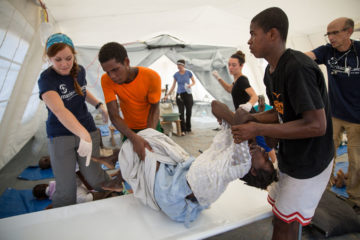
Our team acts quickly to help a distressed patient in Haiti.
“I consider your presence here in Chardonierres a blessing to our community,” Mayor Memeus said. “We are certain that it is Christ who sent you here. For me, your presence is like heaven that just came down.”
Within a few days of our initial setup, a group of about 20 missionaries joined our efforts and drove a 12-truck convoy (that included two dump trucks) from Port-au-Prince to Chardonnieres. That’s at least 8 or 9 stressful hours over rugged terrain. When they arrived, they joined our team to unload and set up the triage, treatment, and recovery tents. Patients were transferred to those units. As soon as the last patient was situated, a powerful thunderstorm hit, but everybody remained safe and dry.
“If that team of missionaries hadn’t been there at that exact time, there’s no way our team of 10 to 15 people could have unloaded those supplies by ourselves, let alone erect the unit,” explained Dr. Carmen Purl of Texas. She’s back on our DART after serving with us in April following the Ecuador earthquake. “If those tents had not been set up and secured, our poor patients would have been caught out in the rain and laying in the mud. That was just God.”
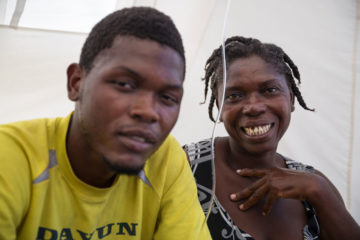
Mrs. Erel Brenchehonne rejoices that her oldest son Rosny survived cholera by God’s grace.
That same message resonates with Mrs. Erel Brenchehonne, whose two sons contracted the disease. First was 18-year-old Brisley. He came in last Wednesday and was hooked up to IVs to rehydrate him. He was treated and released the next day. Then came his older brother Rosny, 21. His condition was much more dire, and he almost died. But praise God, he started improving and was released two days after being admitted.
“I thank God a whole lot because He sent this care here for us,” Mrs. Erel said, a wide smile appearing on her face. “I am a born-again Christian, and only God could have made this happen. If it were not for Samaritan’s Purse, I would have lost both of my sons. The Lord was here.”
God’s miraculous care was also evident in the life of a 35-year-old man, who came in hunched over and in excruciating pain. He had a strangulated hernia in his groin about the size of a half a football. We were not set up to perform emergency surgery, so we advised the family he would need to be taken to a hospital. They said they could do that the next morning. We hooked him up to an IV and administered antibiotics and pain medicine. And we prayed for him.
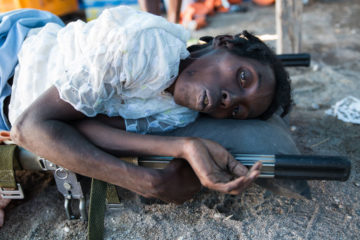
Cholera can be deadly but is easily treatable. Pray for the people of Haiti and our staff as they fight this terrible disease.
When Summer Blackwell, a registered nurse, checked with him early the next day, she was startled and amazed and called her colleagues over. The hernia was gone. “I’ve never seen that happen, that’s God,” she exclaimed. “We then shared with him that it was not our medicine that did that, but God did it. He responded, ‘Oh yeah, this is God. I know that.’” He will still need surgery, but now it’s not an emergency.
Reflecting on what is taking place in his country, Horlritch “Rich” Francois, a Haitian missionary-evangelist, said: “My heart is broken. And as I pray, I wonder why there is so much suffering. But I still praise God for what He is doing. So I’m trusting Him that He will use this situation for His glory. God can turn anything for His glory.”

